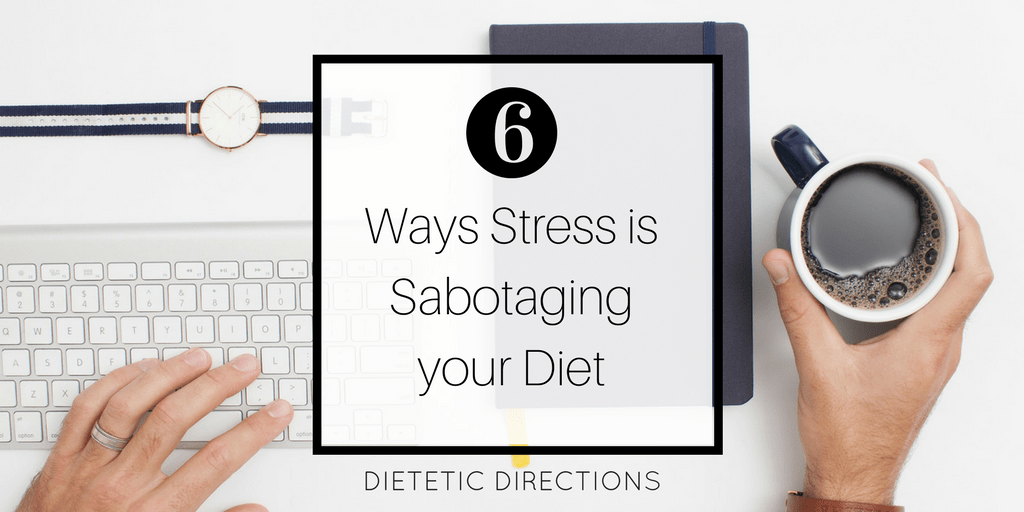
6 Ways Stress is Sabotaging your Diet
In a typical week, how many times do you feel stressed? Be honest. According to Statistics Canada, 23% of Canadians (or 6.7 million people) report feeling ‘quite a bit’ or ‘extremely stressed’ most days. I am sure this is not surprising. After all, stress can easily be our “default-mode” when working, doing household chores, or caring for loved ones. Today’s blog discusses the 6 Ways Stress is Sabotaging your Diet.

What is often overlooked, however, is that stress is sabotaging our diet while wreaking havoc on our bodies and minds. We likely don’t think about the severity of this link because stress seems so common! Today, I will break down the body’s natural stress response and highlight the top 6 ways stress is sabotaging your diet. My intention is to increase stress awareness to inspire diet and behaviour change. In part two of this series, I will highlight powerful nutrition and lifestyle habits to better manage stress.
Stress Scenario:
Imagine this, you are walking home alone through a dark and deserted street. All of a sudden, you hear loud footsteps beating on the pavement behind you. You turn and notice that there is a person running towards you! Your body kicks into high alert; you run faster than you ever have before. Your mind is surprisingly thinking clearly, and you jump over a fence to safety. This intuitive response to danger (or stress) is known as “fight or flight.” Your body is instinctually responding to protect you.
Body Response to Stress:
In the above scenario, as soon as you perceive a threat, the brain sends a message to your adrenal glands to produce cortisol (stress hormone) and adrenaline (putting body into fight or flight response). The liver then releases a sugar into your cells which increases blood flow and increases heart rate. You are given extra physical strength and your bodily functions are temporarily suspended, which means you won’t be thinking about eating or using the bathroom.
The problem with modern day stress is that our bodies can remain in stress-mode for long periods of time – even without a threat. Additionally, our bodies are unable to differentiate physical danger from the high pressure demands or emotional stressors. This means that your body instinctually responds to stress the same way – whether it is stress from your boss breathing down your neck or a vicious wolf.
6 Ways Stress Impacts Your Diet
1. Increased Risk for Health Concerns:
In small doses stress can be good. For example, short-term stress can boost your immune system; however, long-term stress can manifest as illness. The over-exposure to cortisol (the main stress hormone) and other stress hormones can disrupt many (or almost all) your body’s processes.
When faced with on-going (chronic) stress, your “fight or flight” reaction stays on and this increases risk for health conditions such as:
- Heart disease
- Diabetes
- High blood pressure
- Digestive problems
- Obesity
- Headaches
- Memory loss
2. Risk of Weight Gain:
When under stress, our bodies shift into a lower basal metabolic rate (BMR), which means that we burn fewer calories. Our body also shifts into “fat-storage mode.” Cortisol increases fat stored around the stomach and organs (known as visceral fat). This type of fat is linked with increased risk for heart disease and diabetes. Visceral fat also produces more cortisol, than regular fat stores, making it even harder to lose this weight.
DYK: Stress slows our metabolism & increase fat storage? Share on X3. Changes in Appetite:
Appetite tends to fluctuate with stress. According to Harvard Health Publications, when stress is short-term, our brains release a hormone that blunts appetite. However, when stress finally lowers, our body goes into a ‘recovery mode’ which causes our appetite to ramp up. This is why you may find yourself feeling hungrier after (or even during) a stressful period.
4. Increases in Food Cravings:
Stress not only influences our appetite, but also our food preferences and snacking habits. A study found that women consumed more sweets on days they were stressed than days they were not. Additionally, Harvard Health Publications reports that higher levels of cortisol make people more likely to snack. It is hypothesized that the reason for these cravings may have to do with disrupted hunger signals and the body’s release of sugar during stress, leading to an increased desire for high calorie foods.
We also tend to crave certain foods because they appear to temporarily numb uncomfortable feelings of stress. This is what becomes known as emotional eating. Studies done in animals have found that stress increases desire for foods that are high in fat and sugar since these types of foods appear to inhibit the activity in the brain that processes stress and related emotions.
DYK: #Stress impacts our appetite, food cravings & snacking habits Share on X5. Decreases Quality of Sleep
Stress can interfere with falling asleep and staying asleep. This is because stress causes hyperarousal, which can upset the balance between sleep and wakefulness. When our bodies are getting less sleep, they produce more cortisol (stress hormone), which increases our appetite, our desire for unhealthy foods, shifts our metabolism etc.
6. Impacts on Mental Health
Stress impacts not only our physical health, but also our emotional health. Anxiety and depression are common among people facing on-going stress. Stress also increases feelings of fear, anger and frustration leading to physical symptoms like heart palpitations, headaches and stomach upset. These physical and emotional symptoms of stress cause greater stress and anxiety.
Find out how #stress impacts our emotional & physical #health Share on XBottom Line:
Stress is one of the biggest, and often overlooked, health problems facing people today. Stress is a natural body response to protect you. However, when unmanaged, stress can increase your risk for health conditions such as heart disease and diabetes, cause us to store more fat, increase our appetite and cravings, disrupt our sleep and impact our mental health. All of these factors impact our diet and our eating patterns. Next time you are going about your busy day, check in on your stress level. How are you feeling? What can do you do to better manage your stress level to help in living your healthiest, happiest lifestyle?
Be sure to read part two where I share dietary and lifestyle habits proven to help lower stress






